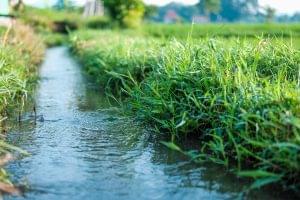With new support options, AM will focus on encouraging water-retaining management practices in the future
For the new agricultural support period starting in 2023, the Ministry of Agriculture planned new and more effective tools to encourage agricultural producers to use water-conserving management practices, but it is equally important to recognize the self-interest of the producers and to be open to the use of suitable agrotechnical tools.

Effective water conservation programs and their support can help avoid the drying out of croplands. (Photo: Pixabay)
Due to the increasingly frequent long, dry periods, the conscious practical application of procedures that help water retention, water retention and soil moisture preservation, as well as the maintenance of soil productivity, become vital for farmers. In addition to recognizing the self-interest of the producers, these goals are encouraged by many elements of the currently operating agricultural support system. At the same time, based on the professional experience gathered in recent years, the Ministry of Agriculture has planned even more and more effective tools to encourage farmers in this area for the new support period starting in 2023. All of the planned green measures of the Hungarian Common Agricultural Policy Strategic Plan submitted to the European Commission at the end of last year build on each other and contain a support element for water conservation, which results in a serious expansion compared to the current period.
Among other things, land use change can be the key to water conservation
The Ministry of Agriculture wants to improve the water retention capacity of soils and ecosystems primarily by encouraging the change of land use, the mosaic of surface cover (fringe habitats, non-productive areas), and the use of water-conserving agrotechniques. Mandatory tools for this are prescribed for everyone in connection with the basic support, and with support we encourage their voluntary use in the agro-ecological program (AÖP), agri-environmental management payments (AKG), support for ecological management (ÖKO), by supporting the development of infrastructure for water retention, and the AM also developed a new investment and maintenance support program for the development of new areas where it is not worthwhile to continue arable production and where wetlands and small-scale water facilities for territorial water retention can be created.
A summary of the most important information about the forms of support that help water retention
1. Among the Good Agricultural and Environmental Status regulations related to the basic support, the regulations regarding minimum ground cover, the preservation of protected landscape elements and lawns, the designation of water protection strips, small lakes, groups of trees and bushes, strips of trees and shrubs as areas of ecological importance, and the creation of ecologically significant secondary crops contributes to water retention. Later on, a new regulation will be introduced in a mandatory manner for everyone, which aims to protect wetlands and bogs.
2. They make farmers interested – and they are supported with special support tools – in improving the water balance of their other farmlands, even by changing the land use of certain areas, in conserving water for as long as possible, creating wetlands and developing small-scale water facilities for regional water retention. Through support, farmers can transform their fields that cannot be cultivated economically or can be used for this purpose into areas with a water retention function and keep them as such. To this end, in the case of area-based basic support, we make these areas taken out of production eligible for support and become eligible for payments (currently, during the inspection, these areas are excluded or do not belong to the concept of eligible area in the first place). Drawing on the lessons of the previous period, we have developed and are launching a new investment and maintenance support program, in the framework of which not only the investments necessary to develop the water retention functions of the areas are financed, but the AM also provides several years of maintenance support.
3. Among the optional regulations of the newly launched voluntary agro-ecology program (AÖP), winter mulching, no-rotation tillage, the use of soil conditioners and microbiological preparations, covering the rows of plantations, and regulations encouraging micro-irrigation contribute to water retention.
4. Many of the general provisions of the three-year agri-environmental management payments that started this year also contribute directly to water conservation, but the thematic set of regulations developed specifically for drought-, erosion- and inland water-sensitive areas was also launched. In the case of supporting organic farming, crop rotation and nutrient replenishment regulations aimed at increasing the productivity and biological activity of the soil contribute to the protection and improvement of the biological condition of the soil, the enhancement of water retention and the protection of water quality.
5. In those agricultural areas where licensed irrigation water is available, developments that improve the efficiency of water use, the creation of water retention facilities, and sustainable water resource management are also encouraged with currently available investment and cooperation support.
The Ministry of Agriculture is confident that the numerous new opportunities will strengthen the use of land use and agrotechnical solutions aimed at water retention in domestic farming practice.
A.M
Related news
The Hungarian Food Book is 50 years old
🎧 Hallgasd a cikket: Lejátszás Szünet Folytatás Leállítás Nyelv: Auto…
Read more >Rapeseed prices fell worldwide and domestically
🎧 Hallgasd a cikket: Lejátszás Szünet Folytatás Leállítás Nyelv: Auto…
Read more >Related news
The Hungarian Food Book is 50 years old
🎧 Hallgasd a cikket: Lejátszás Szünet Folytatás Leállítás Nyelv: Auto…
Read more >








